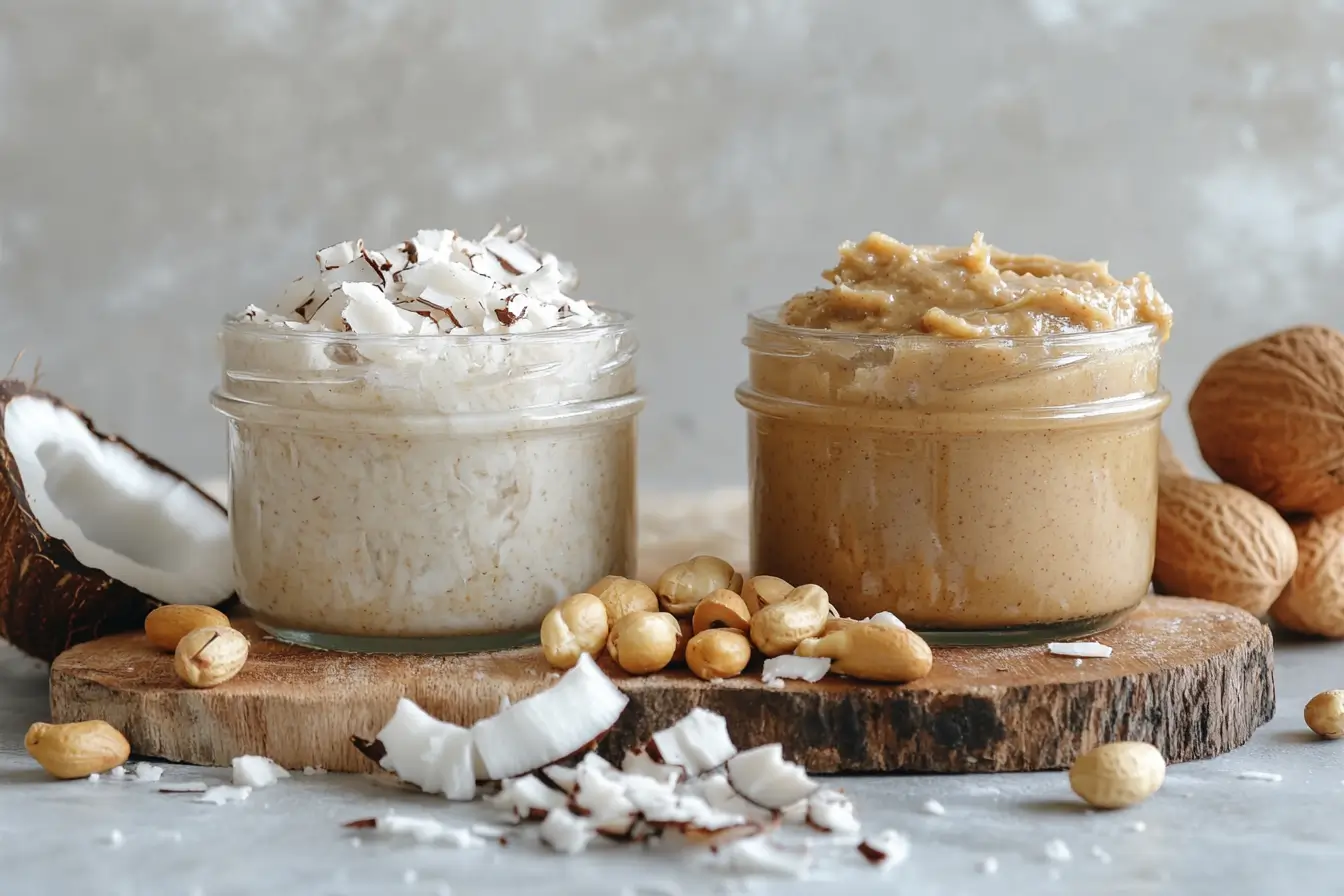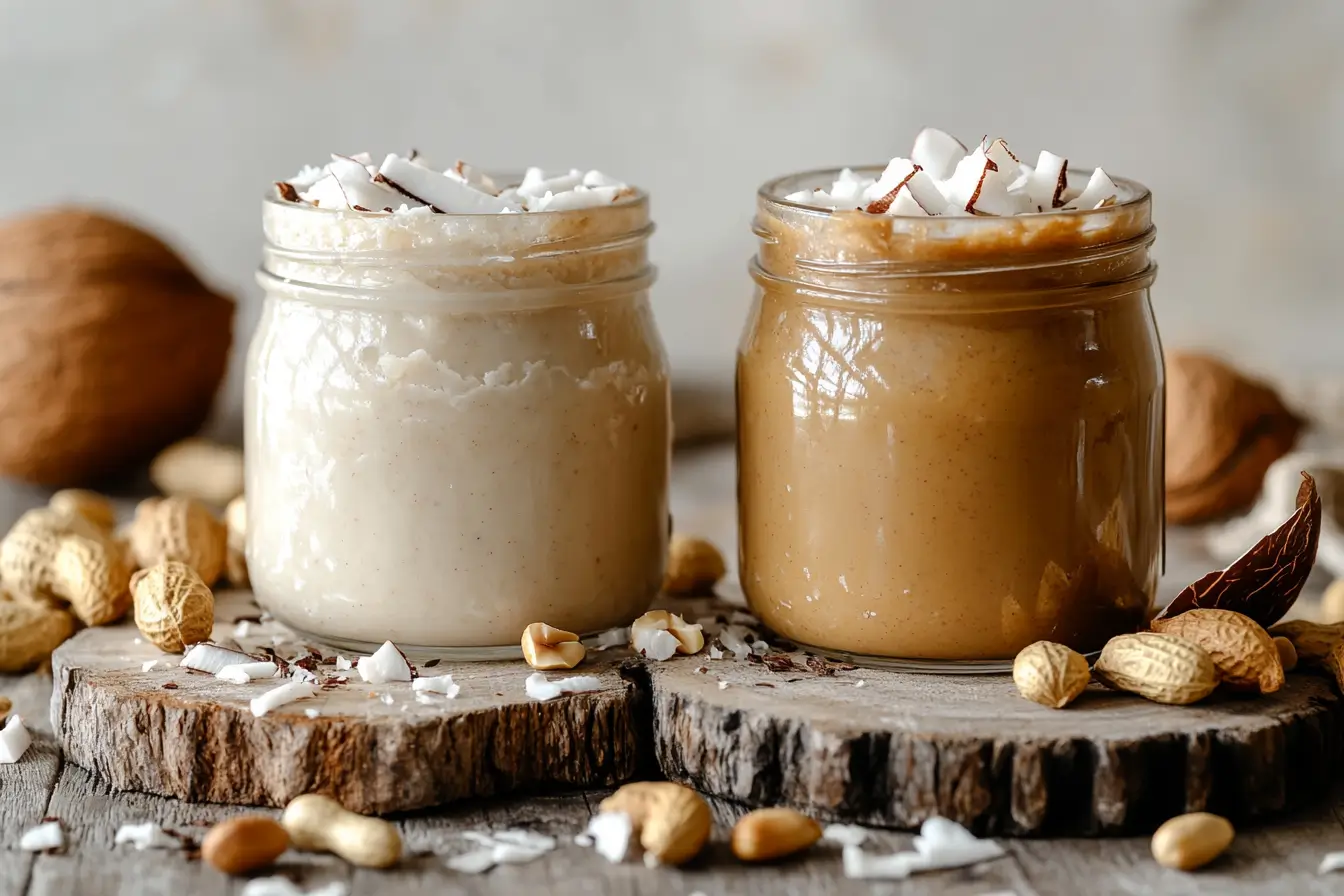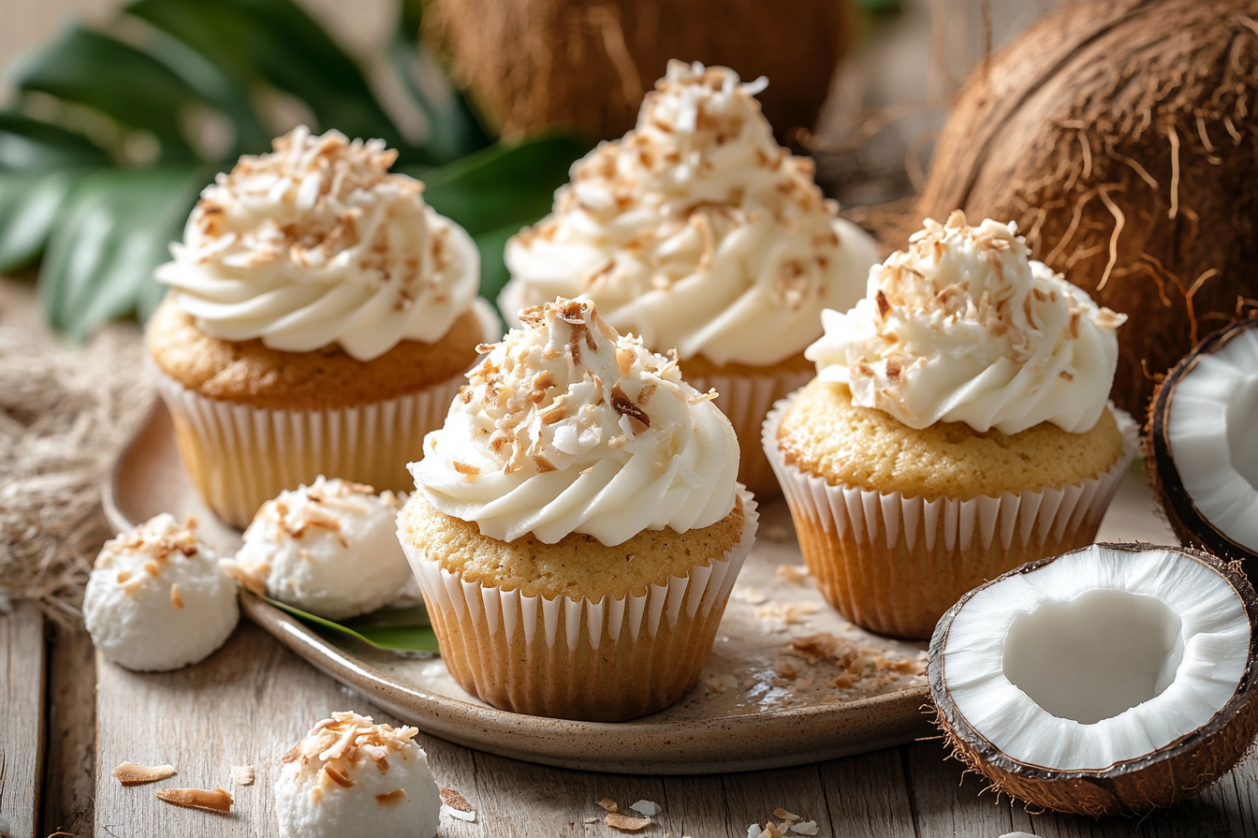To answer the question about Is coconut butter healthier than peanut butter? You’re probably familiar with the classic peanut butter, but have you considered coconut butter as a healthier alternative? With the growing interest in alternative nut and seed butters, it’s natural to wonder how coconut butter stacks up against peanut butter in a health comparison. As you explore your options, you’ll want to know the benefits and drawbacks of each to make an informed decision about your diet.
When it comes to coconut butter and peanut butter, both have their own unique characteristics that set them apart. Coconut butter is gaining popularity for its potential health benefits, while peanut butter remains a staple in many American households. In this guide, you’ll learn about the key differences between coconut butter and peanut butter, including their nutritional content and uses, to help you decide which one is better for your health comparison.
By the end of this guide, you’ll have a better understanding of how coconut butter and peanut butter fit into your overall health and wellness plan, and be able to make a more informed decision about which one to choose for your dietary needs. Whether you’re looking for a healthier snack option or simply want to mix things up, this health comparison will give you the insights you need to make the best choice for your lifestyle.
Understanding Coconut Butter: What Sets It Apart
As you explore the world of coconut products, you may wonder what makes coconut butter unique. The process of coconut butter production involves grinding dried coconut meat into a fine paste, creating a rich and creamy texture. This process is distinct from coconut oil production, which involves extracting the oil from the coconut meat. The result is a product with its own set of coconut butter benefits, including a high content of medium-chain triglycerides (MCTs) and a distinct flavor profile.
One of the key coconut butter uses is as a substitute for traditional butter or oil in cooking and baking. Its high smoke point makes it ideal for sautéing and frying, while its creamy texture adds depth to baked goods. You can also use coconut butter as a spread on its own, or blend it with other ingredients to create a delicious and healthy snack. The versatility of coconut butter makes it a great addition to any kitchen, and its potential health benefits make it a popular choice among health-conscious consumers.
Some of the unique properties of coconut butter include its:
- High content of MCTs, which may aid in weight loss and improve energy levels
- Rich, creamy texture, making it a great substitute for traditional butter or oil
- Distinct flavor profile, which adds depth and complexity to a variety of dishes
In terms of coconut butter benefits, research suggests that it may have antimicrobial properties, making it a great addition to your skincare routine. Additionally, the MCTs present in coconut butter may help to boost your energy levels and support weight loss. With its many uses and potential benefits, coconut butter is a great product to incorporate into your daily life.
The Basics of Peanut Butter Nutrition
When it comes to peanut butter nutrition, you can expect a rich source of protein, healthy fats, and various essential vitamins and minerals. Peanut butter is a staple in many diets, and its peanut butter health benefits are numerous. With approximately 8 grams of protein per 2-tablespoon serving, it’s an excellent option for those looking to boost their protein intake.
One of the key aspects of peanut butter nutrition is its fat content. While it’s high in fat, the majority of it is made up of healthy monounsaturated and polyunsaturated fats. These fats can help lower bad cholesterol and reduce the risk of heart disease. Additionally, peanut butter is a good source of fiber, containing about 2 grams per serving.
- Reducing the risk of heart disease due to its healthy fat content
- Providing a feeling of fullness and satisfaction, making it a great snack for weight management
- Supporting muscle growth and repair with its high protein content
It’s worth noting that not all peanut butters are created equal. Natural peanut butter tends to have fewer added ingredients and less sugar than processed peanut butter. When choosing a peanut butter, look for one with minimal ingredients and no added oils or sugars to reap the most peanut butter health benefits.
Is Coconut Butter Healthier Than Peanut Butter? Breaking Down the Facts

When it comes to coconut butter vs peanut butter, the debate often centers around their nutritional comparison. To make an informed decision, let’s dive into the key differences between these two popular spreads. You’re likely wondering which one is the healthier choice, and the answer lies in their nutritional profiles.
A nutritional comparison of coconut butter and peanut butter reveals distinct differences in their caloric content, fat profiles, and protein and fiber content. Here are some key points to consider:
- Caloric content: Coconut butter generally has more calories than peanut butter, with approximately 100 calories per tablespoon compared to peanut butter’s 95 calories.
- Fat profile: Coconut butter is high in saturated fats, while peanut butter contains more unsaturated fats.
- Protein and fiber content: Peanut butter tends to have more protein and fiber than coconut butter, making it a popular choice among fitness enthusiasts and health-conscious individuals.
Ultimately, the choice between coconut butter and peanut butter depends on your individual dietary needs and preferences. By understanding the nutritional comparison between these two spreads, you can make a more informed decision that aligns with your health goals.
Health Benefits of Coconut Butter
Coconut butter is a nutrient-rich food that offers several health benefits. One of the key advantages of coconut butter is its high content of medium-chain triglycerides (MCTs), which are easily metabolized by the body. This makes coconut butter a great source of energy, particularly for athletes and individuals who engage in high-intensity activities.
Coconut butter also has antimicrobial properties, thanks to its high lauric acid content. Lauric acid has been shown to have antibacterial and antiviral properties, making it an effective tool in fighting off infections. Additionally, coconut butter has been found to have energy-boosting effects, making it a great addition to your daily diet.
Key Benefits of Coconut Butter
- Rich in MCTs for easy energy
- Antimicrobial properties to fight off infections
- Energy-boosting effects to support daily activities
Overall, coconut butter is a nutritious and versatile food that can be incorporated into your diet in a variety of ways. Whether you use it as a spread, add it to your smoothies, or use it in cooking, coconut butter is a great way to support your overall health and wellbeing.
Using Coconut Butter for Optimal Health
To get the most out of coconut butter, it’s essential to choose high-quality products that are rich in MCTs and lauric acid. Look for products that are free from additives and preservatives, and that have been produced using sustainable and eco-friendly methods.
| Benefit | Description |
|---|---|
| Rich in MCTs | Easy to metabolize, providing a quick source of energy |
| Antimicrobial properties | Fights off infections and supports immune system function |
| Energy-boosting effects | Supports daily activities and exercise routines |
Key Advantages of Peanut Butter
Peanut butter is a popular spread that offers several health benefits, particularly due to its high peanut butter protein content. This makes it an excellent choice for athletes or individuals looking to build muscle. Additionally, peanut butter is rich in heart-healthy monounsaturated fats, which can help lower bad cholesterol levels and reduce the risk of heart disease, thus supporting peanut butter heart health.
Some of the key benefits of peanut butter include:
- High in protein to support muscle growth and repair
- Rich in monounsaturated fats for peanut butter heart health
- Good source of vitamins and minerals like vitamin E and magnesium
Studies have shown that consuming peanuts and peanut butter can have potential benefits for peanut butter heart health and longevity. With its rich nutrient profile and delicious taste, peanut butter is a great addition to a healthy diet.
Making the Right Choice for Your Diet
When choosing between coconut butter and peanut butter, dietary considerations play a significant role. You need to think about your individual needs and how each option fits into your lifestyle. Whether you’re managing a specific diet or simply looking for a healthier alternative, understanding the differences between these two butters is crucial.
Consider your dietary restrictions, such as nut allergies or low-fat diets, which can greatly influence your decision. Lifestyle factors like fitness goals or cooking preferences also come into play. For instance, if you’re a fitness enthusiast, you might prefer coconut butter for its unique properties and potential energy-boosting effects.
Dietary Restrictions to Consider
- Nut allergies: If you have a tree nut allergy, peanut butter might not be the best choice.
- Low-fat diets: Coconut butter generally has a higher fat content than peanut butter.
- Vegan or vegetarian diets: Both coconut butter and peanut butter can be suitable options, but always check the ingredients and manufacturing process.
Additionally, budget considerations are essential. Compare the typical costs of coconut butter and peanut butter to factor in the expenses. You might find that one option is more affordable than the other, depending on your location and availability.

Lifestyle Factors
Your personal preferences and lifestyle can also sway your decision. Think about how you plan to use the butter – for cooking, baking, or as a snack. This will help you decide which one is the better fit for your daily routine.
Creative Ways to Use Both Butters
When it comes to coconut butter recipes and peanut butter recipes, the possibilities are endless. You can use them as a spread on toast, blend them into smoothies, or bake them into delicious treats. For a tasty snack, try making coconut butter energy balls by mixing coconut butter with oats, honey, and chocolate chips.
Here are some more ideas to get you started:
- Use peanut butter as a sauce for noodles or stir-fries
- Add coconut butter to your favorite curry recipe for a creamy twist
- Make a peanut butter and banana sandwich for a classic snack
- Blend coconut butter with frozen berries and milk to make a refreshing smoothie
As you experiment with coconut butter recipes and peanut butter recipes, remember to have fun and be creative. You can also try making your own peanut butter at home by grinding peanuts in a food processor. With a little practice, you’ll be a pro at making delicious and healthy treats with both butters.
Whether you’re a fan of coconut butter recipes or peanut butter recipes, there’s no denying the versatility and deliciousness of both. So go ahead, get creative, and enjoy the process of discovering new favorite recipes.
Potential Drawbacks and Considerations
When it comes to the question: Is coconut butter healthier than peanut butter?, there are several factors to consider before making a decision. You may be concerned about allergies, storage requirements, or processing methods. A coconut allergy, for instance, is relatively rare compared to a peanut allergy, but it’s still essential to be aware of the risks. If you’re allergic to tree nuts, you may also need to exercise caution with coconut products.
Nut butter storage is another crucial aspect to consider. To maintain freshness and prevent spoilage, it’s recommended to store both coconut butter and peanut butter in a cool, dry place. You can also refrigerate or freeze them to extend their shelf life. Proper storage will help preserve the nutritional value and flavor of the nut butters.
In terms of processing methods, some commercial brands may use hydrogenation or add preservatives to extend the shelf life of their products. However, these methods can affect the nutritional value of the nut butters. When shopping for coconut butter or peanut butter, look for products that are minimally processed and contain only natural ingredients. By being mindful of these factors, you can make an informed decision and enjoy the benefits of these nutritious spreads.
- Always check the ingredient label for potential allergens
- Store nut butters in a cool, dry place or refrigerate/freezer to maintain freshness
- Opt for minimally processed products with natural ingredients
By considering these potential drawbacks and taking steps to mitigate them, you can safely incorporate coconut butter and peanut butter into your diet and reap their nutritional benefits.
Conclusion: Is coconut butter healthier than peanut butter?
As you’ve seen, both coconut butter and peanut butter have their own unique nutritional profiles and potential health benefits. When it comes to choosing between these two versatile spreads, the decision ultimately comes down to your personal dietary needs, taste preferences, and lifestyle factors.
If you’re looking to incorporate more medium-chain triglycerides (MCTs) and antimicrobial properties into your diet, coconut butter may be the better choice. On the other hand, if you prioritize higher protein and fiber content, peanut butter could be a better fit. Ultimately, the key is to find a balance that works for your balanced diet and helps you achieve your choosing healthy nut butters goals.
Remember, variety is essential for a well-rounded, nutrient-dense diet. Don’t be afraid to experiment with both coconut butter and peanut butter, finding creative ways to incorporate them into your meals and snacks. By listening to your body and making informed decisions, you can enjoy the unique benefits of each spread and maintain a healthy, balanced lifestyle.
FAQ: Is coconut butter healthier than peanut butter?
What is the difference between coconut butter and coconut oil?
Coconut butter is made by blending the entire coconut meat, including the fiber and oil, while coconut oil is extracted from the coconut meat. This gives coconut butter a thicker, creamier texture and a more pronounced coconut flavor compared to coconut oil.
Is coconut butter a good source of healthy fats?
Yes, coconut butter contains a high amount of medium-chain triglycerides (MCTs), a type of healthy fat that may have beneficial effects on metabolism and weight management.
How do the nutritional profiles of coconut butter and peanut butter compare?
Coconut butter tends to be higher in saturated fat but lower in protein compared to peanut butter. Peanut butter is also a good source of heart-healthy monounsaturated fats and various vitamins and minerals.
Can people with peanut allergies consume coconut butter safely?
In general, yes. Coconut is not a tree nut, so people with peanut allergies can typically consume coconut butter without issue. However, it’s always best to check with your healthcare provider before trying a new food if you have any food allergies or sensitivities.
How should I store coconut butter and peanut butter to keep them fresh?
Both coconut butter and peanut butter should be stored in a cool, dry place, such as a pantry or cupboard. Coconut butter may become harder and more solid at cooler temperatures, so you may need to gently warm it before using. Peanut butter should be kept away from heat and moisture to prevent spoilage.
Can I use coconut butter and peanut butter interchangeably in recipes?
While you can substitute one for the other in some recipes, they have different flavors and textures that may affect the final outcome. Coconut butter is typically thicker and has a more pronounced coconut taste, while peanut butter has a nuttier flavor. It’s best to experiment and see which one works better for your specific recipe.

